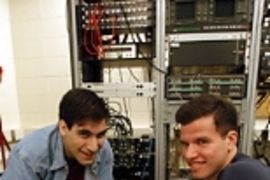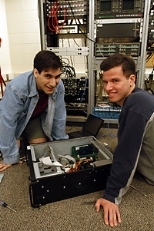- Library provides free on-demand immediate access to thousands of classical and contemporary CDs to students, faculty, staff
- MIT to publish open system software and design for implementation at other universities
CAMBRIDGE, Mass.--Two students at the Massachusetts Institute of Technology today unveiled a campus-wide electronic music library that will provide students, faculty and staff with on-demand access to thousands of classical and contemporary recordings from many areas on MIT's campus, including student dormitory rooms and faculty offices. They plan to make the software that drives the library available to other universities as open-source software.
The new campus-wide music library, known as the Library Access to Music Project or LAMP (lamp.mit.edu), grew out of the students' two-year research project to come up with a fully-licensed program for on-demand listening.
LAMP provides access to 3,500 contemporary and classical CDs and was created by Keith Winstein, 22, a graduate student in electrical engineering and computer science, and Josh Mandel, 21, a junior in the same major. The two students wanted to find a free, legal way for students to listen to their favorite CD when and where they wanted, without requiring a trip to the library.
"Traditional music libraries are great, but you have to be willing to go to the campus library and check out a CD," said Winstein. "We wanted to be as convenient as possible, and that means letting patrons listen to CDs easily and immediately."
The challenge for the students was figuring out how to offer an instantly-accessible, campus-wide, on-demand music library without breaking the copyright law.
Instead of using the Internet or MIT's internal network to transmit music to listeners, Winstein and Mandel turned to MIT's cable television system. The LAMP system lets listeners hear the CD, but not download or copy it. Because it is impossible to record exact copies of CDs from a non-digital source, the licensing requirements are similar to the requirements for radio stations.
MIT, like most universities and radio stations, pays for blanket licenses from the three organizations--ASCAP, BMI, and SESAC--that have the power to authorize analog public performances of virtually all songs. The "analog" licenses are available at a reasonable cost to the university. Estimated costs of licenses for unlimited digital transmissions would be much higher.
MIT students, faculty and staff can choose music at LAMP's web page by selecting a CD or song. Songs play directly to listeners' stereos and televisions through the LAMP system. A listener can pause, rewind and fast-forward the song or CD using the web-based control system. The sound is better than broadcast FM radio, but not as high quality as a CD played on a home stereo.
Winstein and Mandel set up a yearlong online survey to collect a "wish list" of CDs students wanted them to buy. By the time the survey closed, 700 students had submitted 3,500 CDs. "We ended up buying them all," said Mandel. In the next year, Winstein and Mandel hope to expand the library's collection to 7,000 CDs.
Winstein and Mandel will also publish the design and software driving LAMP as "open-source," available to be freely implemented elsewhere, especially at other universities. Winstein estimates the cost for another university to replicate LAMP at about $10,000 in off-the-shelf equipment, plus $25,000 to buy the CD collection. The total recurring cost is about 60 cents per student per year for licenses from ASCAP, BMI, and SESAC.
The LAMP project was supervised by professor of computer science and engineering Hal Abelson, and funded by the iCampus research alliance between MIT and Microsoft Research, which endows faculty and student projects to enhance university education through information technology.
ABOUT iCAMPUS
iCampus, the MIT-Microsoft Alliance, is a 5-year, $25 million initiative to improve the quality of higher education through a combination of information technology tools and innovative teaching methods. MIT researchers and Microsoft software engineers are working together to enable a host of cutting edge technologies -- wireless, streaming video, collaborative software, simulation, virtual reality, and more - to facilitate the delivery of engaging, interactive, team-based, project-oriented, hands-on, and student-driven learning experiences. Learn more at web.mit.edu/icampus.







